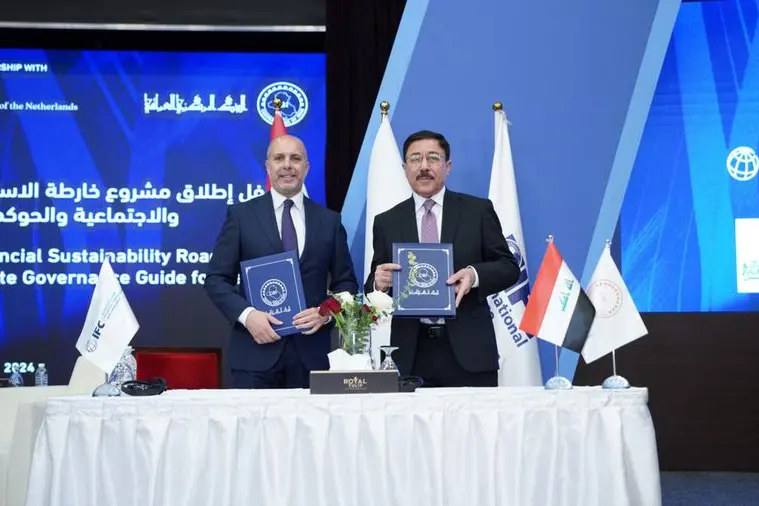PHOTO
Baghdad, Iraq – IFC, a member of the World Bank Group, in collaboration with the Central Bank of Iraq (CBI), today signed an agreement to develop environmental and social risk management guidelines for the banking sector, and launched a seven-year Sustainable Finance Roadmap and an Environmental, Social, and Governance (ESG) Code to improve sustainable financing for the sector and strengthen the country’s financial infrastructure.
The Sustainable Finance Roadmap, which outlines the Central Bank of Iraq’s strategic plan for 2023 – 2029, aims to improve the performance of Iraqi banks in areas like environmental and social risk management, encourage the availability of sustainable banking products, and increase the competitiveness of the banking sector. The Plan, which encompasses developing an ESG code, also aims to support financial stability, reduce environmental and sustainable risks, and promote social development.
“The global demand for sustainable financial products highlights the need for banks to consider ESG issues in their risk management framework to attract investments," said H.E. Ali Mohsen Ismail, Governor of the Central Bank of Iraq. "As a Central Bank, we play a key role in sustaining the development, growth, and financial stability of Iraqi banks, ensuring their ESG performance matches international standards.”
The new ESG Code sets forth specific standards and practices that Iraqi banks can incorporate into their business strategies and investment decisions, paving the way for greater mitigation for ESG risks across the banking sector.
“This partnership marks a significant milestone in Iraq’s strategic approach towards sustainable finance and demonstrates IFC’s commitment to partnering with the country’s Central Bank and the banking sector to strengthen its financial infrastructure and increase the competitiveness of its banks,” said Fawaz Bilbeisi, Regional Manager for IFC in the Kingdom of Saudi Arabia, Iraq, and Lebanon. “This ESG Code will help banks improve their performance on accountability, responsibility, management and resilience, which are critically important for clients, shareholders, investors and Iraq's sustainable development.”
This ESG Code was developed according to the relevant Iraqi laws and global best practices issued by financial institutions like IFC, the Organization of Economic Cooperation and Development (OECD), the Basel Committee on Banking Supervision (BCBS), the Accounting and Auditing Organization of Islamic Financial Institutions (AAOIFI), the Islamic Financial Services Board (IFSB), and the International Sustainability Standards Board (ISSB) of the International Financial Reporting Standards Foundation.
IFC has been a pivotal driver of private sector development in Iraq, channeling over $1.9 billion since 2005 to fuel the growth of its businesses in the context of diversifying the country’s economy. IFC’s current committed portfolio stands at around $350 million, invested in dynamic sectors such as energy, telecoms, and banking. IFC has also launched several advisory projects to mobilize private sector investment through public-private partnerships, expand access to finance for local businesses, and support Iraq's entrepreneurial ecosystem. This initiative also reflects how IFC’s strategy in Iraq continues to focus on strengthening the Iraqi banking sector via both investment and advisory services, helping pave the way for the country’s sustainable development.
About IFC
IFC — a member of the World Bank Group — is the largest global development institution focused on the private sector in emerging markets. We work in more than 100 countries, using our capital, expertise, and influence to create markets and opportunities in developing countries. In fiscal year 2024, IFC committed a record $56 billion to private companies and financial institutions in developing countries, leveraging private sector solutions and mobilizing private capital to create a world free of poverty on a livable planet. For more information, visit www.ifc.org.
In Amman:
Name: Emmanouela Markoglou
E-mail: emarkoglou@ifc.org



















